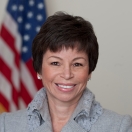
When I began my legal career in 1981, I was an anomaly. There were few women lawyers in my Chicago firm, and our client base was mostly male as well. Of course, I came to realize that our office was just a microcosm of the profession as a whole. In the early 1980’s, women represented less than 10 percent of licensed female attorneys in America.
But in 1981, Sandra Day O’Connor was nominated to serve as the first female Supreme Court Justice, and things began to change. Her nomination represented a huge victory for women in my profession and for women all across America who had routinely confronted massive pay disparities, blatant discrimination, and gender stereotypes in pursuit of professional advancement. With her confirmation and service on the Supreme Court, a seemingly unbreakable glass ceiling had finally been shattered.
More than 30 years later, as my daughter prepares to embark on her own legal career, a critical mass of women at the pinnacle of the judicial profession is beginning to take shape. With the Senate’s confirmation yesterday, Elena Kagan will join Justice Ruth Bader Ginsburg and Justice Sonia Sotomayor as the third woman justice on the Supreme Court. This will be the first time in history that three women have actively served on the Court, and President Obama has become the only President to nominate two women to our nation’s highest court. Today is a very proud day for women and girls all across America.
At all levels of the judicial system, President Obama has made great progress on behalf of women. Nearly half -46%- of his judicial nominees to date are women, more than doubling the percentage of female appointments from the previous administration. President Obama’s nominees include Barbara Keenan, the first woman from Virginia to sit on the Fourth Circuit, and Rogeriee Thompson, the first woman from Rhode Island, as well as the first African-American, to sit on the First Circuit.
Such progress has come in the face of steep obstructionism from Senate Republicans. Of the 17 circuit and district court nominees pending on the Senate floor, nine are women. Sixth Circuit nominee Jane Stranch has been waiting over eight months for a floor vote despite the support of her Republican home-state Senators. District court nominees Kimberly Mueller and Catherine Eagles were voted out of committee without Republican opposition but have been waiting over three months for floor votes. Just yesterday, there was an objection to a vote on Kimberly Mueller’s nomination. District court nominees Ellen Hollander and Susan Nelson were also voted out of committee, without Republican opposition, but have been waiting nearly two months for floor votes.
Despite such entrenched resistance, President Obama remains committed to enhancing the diversity and excellence of our judicial system. And there is no better evidence of this commitment than his nomination and the confirmation of Elena Kagan to the Supreme Court. She is a trailblazer in her own right, serving as the first female Solicitor General of the United States, and before that, as the first woman Dean of Harvard Law School. Her remarkable career has earned her countless accolades from academia, the legal profession, and across the political spectrum.
Today, I had the opportunity to meet with a group of law students from the University of Michigan, my alma mater. I shared this historic moment with them, because it is in such moments that we gain clarity. We can see that real change is possible. We can see the result of the struggles of those that came before, those who endeavored to make our legal system -and our country- more open, more representative, more just. And we can see that it is our job to keep the momentum moving forward. It is, above all, an inspirational moment. And one that I hope will translate into further progress for future generations of aspiring, American jurists.
Valerie Jarrett is Senior Advisor to the President and Chair of the White House Council on Women and Girls


